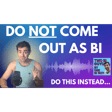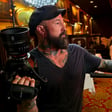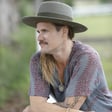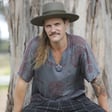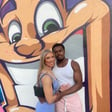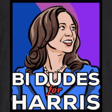Introduction to Season Finale
00:00:12
Speaker
Hello, and welcome to the season finale of Two By Guys. I'm Rob.
Interview with A. Billy S. Jones-Hennen and Chris Hennen Jones
00:00:17
Speaker
In this episode, you will hear the second part of my interview with two married by guys, civil rights and queer activist, A. Billy S. Jones Hennen, and his husband of over 40 years, Chris Hennen Jones. If you haven't listened to part one yet, I encourage you to go back and start there. I learned so much from hearing about their journey, and I know that you will too.
00:00:40
Speaker
And if you have, without further ado, here is more from A. Billy and Chris. Enjoy.
Role and Visibility of Bisexual Elders
00:00:55
Speaker
I want to ask about your your role in the bi community, because as a bisexual person, we are really lacking in bi elders. I mean, there's no shortage of LGBT
00:01:10
Speaker
elders, queer elders, but I never really saw that many who were specifically bi identified. You're kind of in a league of your own almost. What's it like to be a community elder both as a role model and just as someone who's been in the community for many years? Has your role as a bi person in the LGBT community changed over time?
00:01:37
Speaker
What's it like to be that kind of role model? Do you see yourself that way? I don't know if I see myself as a role model.
Recognition by National Black Justice Coalition
00:01:50
Speaker
Am I a role model in the bike? I don't know. I guess I am. I think so. Robin Oaks thinks so. I was recently honored by the National Black Justice Coalition with
00:02:04
Speaker
James Baldwin Legacy Award, and I was very happy that they introduced me. And the award I was getting apparently was because of my activism in the bi community, which again was here in D.C., active with the bi community as well as on
00:02:27
Speaker
national level, but it's more around within other organizations pushing for simple things like, okay, we need to be more inclusive of bisexual. Let's look at our mission statement. Let's look at
00:02:49
Speaker
our name of how we identify ourselves to the public. And I never, I guess I am a role model in some cases only in the sense that I'm often am the only one that's out about it.
Visibility and Coming Out at Conferences
00:03:06
Speaker
And the joy I get
00:03:09
Speaker
by identifying myself when I'm invited to conferences to be on a workshop, to do a workshop, to be on a panel or to be a keynote speaker is that invariably young folks will come to me and say, thank you, I am bisexual also. But they're not necessarily comfortable saying that publicly. Yeah. And I find I had an attorney
00:03:39
Speaker
that do a bisexual awareness week in September. The group already knew I was bisexual, but my effort wasn't for me to come out so much to make them aware that September 23rd is Bisexual Awareness Day and we celebrate the whole week.
00:04:04
Speaker
And right after I finished saying that, this attorney came out and said, yeah, I identify as bi also. And of course, that was the first awareness. We've talked since he's in a marriage. His wife knows that he's bi. But he, you know, professionally had not come out.
00:04:32
Speaker
Yeah, we're so invisible that really just being out is such a big part of the battle and being visible.
Challenges of Identifying as Bisexual in Formal Settings
00:04:43
Speaker
I will identify Chris as my spouse at a doctor's office or wherever, and then of course they will refer to me as gay and I go, nah, I'm not gay.
00:04:59
Speaker
You know, I'm in a same gender-loving relationship. I identify as bisexual. They don't even have bisexual as an option. And I said, well, write it down. Write it down. Let me spell it for you. Good. Good for you. I said, look at the first three letters in my first name. It says A by.
00:05:31
Speaker
Yeah, I think that one of the challenges is, you know, bisexuals have always existed. Right. And it's only been, you know, maybe since our generation that that the whole concept of homosexuality and the definitions have definitely become important because because of the oppression and because of the status quo of dealing with all these issues in very negative ways.
00:06:02
Speaker
But in reality, there was a lot of bisexuality, a lot of very interesting things going on just below the surface, and people who were sophisticated enough to process these things accepted them.
Chris's Family Background and Hidden Bisexuality
00:06:16
Speaker
I mean, in Billy's particular case, his dad was bisexual.
00:06:21
Speaker
And I know that in my- So you like to out my dad? I am. I'm also outing, I can out my dad. When I came out to him, I was about 25 at the time. You know, I basically told him that I was exploring relationships with men over and above my relationship with my wife. And he said that, you know, he just blurted out. He said, you know, I'm really happy for you because
00:06:49
Speaker
When I had those similar feelings, it was better to be dead than admit having them. And then I realized that he had one particularly pretty serious relationship with another married man when he was my age at that time. And then you begin to look at albums and I saw that I had a grandfather that had a best friend for years.
00:07:16
Speaker
know, that he maintained. And I still remember visiting my great-grandparents, great-mother, grandmother, and going to church and seeing this woman come into church with two men every Sunday. And I wanted to know what that was all about. I was nine at the time, but
00:07:37
Speaker
that was already in my mind, you know, well, this is a neat marriage. And my grandmother was sort of uppity, you know, used to shush me up and tell me that I don't ask such questions. But I nailed my great-grandmother and basically asked her, you know, can you explain to me what's going on? And she said, well, if I can be, if you can have confidence that I will keep this to myself, she basically said that one of the men,
00:08:07
Speaker
Her first husband had gotten scarlet fever and was not able to have sexual relations or even children. And so she had another man and they decided to live in S3. And these were people who were of means and it was socially accepted within a very provincial
00:08:33
Speaker
of France, but it was accepted that, you know, that's the way they had arranged it and that was the way it was going to be. I just think there are so many stories like the ones you just shared and so thank you for sharing them because they are so hidden. I think they'll often remain hidden forever unless we share them.
Exciting Developments in Queer Activism
00:08:59
Speaker
Is there anything going on currently in the world of queer activism, queer representation that is exciting, either of you at the moment, or any leaders in the community you're following? Whether it's bi or queer in general, what's exciting you lately about where it's headed?
00:09:23
Speaker
I think for me what's exciting is seeing more and more and more young folks coming out as bi or as gay or as lesbian or as queer or non-gender conforming is very exciting and of course the language continues to expand not shrink but
00:09:51
Speaker
expand on. You started off asking about our pronouns. I think we both identify as he, him, his. Right, baby? Okay. But I always tell people, if you have another pronoun for me, go for it. I'm okay with it.
00:10:11
Speaker
We were discussing high heels the other day, but I said, well, I'll be in my wheelchair. I can still wear high heels. But that's what's exciting to me. I mean, you know, to have professor athletes come out and identify themselves openly as gay or bi or, you know, as a sexual minority, it's just
00:10:42
Speaker
We have a ways to go. We've not arrived. And the research continues to say that within the queer community, bisections are the majority. Unfortunately, we are also probably the most closeted about it. Exactly. And that's unfortunate. And I feel that
00:11:10
Speaker
Our community is still least accepting of us and least understanding of bisexuals. So we have a lot of sensitivity and education still to do within our community.
Building an Inclusive Community in Mexico
00:11:32
Speaker
I think that a lot of work has to be done on a personal level. I know that we live half the year in Mexico.
00:11:40
Speaker
And we sort of created a little community in where we live in Mexico. And it's been interesting because at the beginning, they had a bit of confusion understanding, you know, my ex-wife was living with us for a good part of the time, really was going through a lot of convalescence because of his issues. I've had a lover there who's been
00:12:11
Speaker
part of our family and we've made it work. We've made it work in the sense that we function as a family and I have a crew of people that work for me down there and we all lead together and make a community of it. And for me it's been really interesting how we spent a few years really not talking about what was going on. And then slowly but surely we got to talking about it.
00:12:40
Speaker
And for me, it's been fascinating to see particularly these guys who are, you know, they tend to be pretty square initially as to diversity ways of living, but surely they warm up to it and have really gotten to appreciate us and we've appreciated them and felt more and more accepted. That's a lot of the groundwork, I feel,
00:13:08
Speaker
that is going on, but really isn't necessarily appreciated outside of the nuclear experiences.
Understanding and Accepting Cultural Diversity
00:13:16
Speaker
Yeah. We have a transgender nieces there who also identifies as bisexual, and she's in a relationship with a person that is transitioning to become a woman.
00:13:35
Speaker
pretty much all the way transitioned by now, but Chris and I were struggling with the pronouns and- And we've had our own prejudices as well. I mean- It definitely highlights it, but the Mexican guy that worked with us would correct us. No, no, no, it's a woman, it's a woman. They went there much easier
00:14:04
Speaker
And we were able to make the transition. They seemed to have just very readily accepted it. Interesting. Well, it's interesting what you said, because in other words, it's almost like there's this ground game going on in the LGBT community of
00:14:22
Speaker
conversations within a family or within close friends, and that will trickle up even though it may not be as visible as the leaders of the community who are out there. I think what you're saying is it's happening under the surface. It's bubbling under there. People are learning more in their nuclear units, which is a great place to learn.
00:14:51
Speaker
I have a couple listener questions. Can I ask you, they're like advice questions. Okay.
How to be a Supportive Bi Parent?
00:14:57
Speaker
Okay. So you mentioned your kids, five kids together, other kids from another marriage, many grandchildren. Ten grandchildren. Ten grandchildren. Wow. Congratulations. Do you have any advice either on being a bi parent or on parenting queer kids?
00:15:19
Speaker
Well, my biggest advice probably is if you're going to have kids, definitely spend a lot of time talking about what your intentions are and get them down on paper and at least come to an understanding of what is important and what is important is supporting this kid. And
00:15:46
Speaker
I think the kid will turn out the best he or she possibly can as long as everyone involved is aware that their primary intention is supporting the birth and growth of a new being. I think I came, my family was sort of definitely the opposite of Christopher's family. It was a very loving, intimate,
00:16:16
Speaker
I made the express intimacy very open. I talked about sex very open. I had an uncle that, he was, I don't know how to say, he would get drunk on weekends and cross-dressed and then strut up and down the street.
00:16:43
Speaker
And my dad would have to go get him and drag him in. And he would always sober up Sunday night and go back to work. But every weekend, he would come up with something. And finally, my mother just said, you know, if you're going to do that, you need a better wig. And she started training him how to walk and how to stretch.
00:17:11
Speaker
I never knew that my dad was bisexual. I came out to him about being attracted to men before anyone else. I was talking to him about it. He kept asking me, what's the problem? What is the problem? And I gradually got it out. And coming from a medical family of a doctor and a nurse,
00:17:40
Speaker
his advice was sort of concerned about being discreet, concerned about sexually transmitted disease, but he never advised me otherwise. He just said, well, it's normal that you would have these feelings. And it was my mom that after his passing,
00:18:10
Speaker
And I started to come out to her, and her response was, oh, you're just like your dad. And Uncle George, she's out with two people at the same time. Well, uncle in the black community, everybody had to admire. You didn't call adults by that first name. And my dad's closest friend was called Uncle George.
00:18:37
Speaker
they were both married and both their wives knew about them. So I thought that was really a role model for me without me realizing that. I just knew they spent a lot of time together. But in terms of advice, I think, especially with kids, I think it's just being lovable and being honest about yourself, being able to talk about
00:19:07
Speaker
sexual minorities in a positive manner that kids can hear you talk about it and not sweep it under the rug. And if there is something, if you depict it in a negative way, you have the opportunity to talk about the positive side of it.
00:19:32
Speaker
In much the same way that we talk about social justice as it relates to people of color, we have to talk about social justice as it relates to the LGBTQ community also. One of the outlets that I've gotten into, just since I retired, I spent a lot of time on the internet communicating with guys from all over the world.
00:20:01
Speaker
And for me, it's been fascinating that most of their introductions, as always, I'm looking for the one and only person that I want to spend the rest of my life with. And I've been sort of challenged asking them, why in the world would you want to do that? To just get into a dialogue. And I've had maybe
00:20:31
Speaker
two or 300 people that I've communicated with over the last six years, just being able to share, you know, just the spectrum of possibilities and get them to, you know, and unfortunately, a lot of these people are from countries like Russia or different African countries where they just want a lifeline to, to figure out what their options are, what, what, um,
00:21:00
Speaker
you know, if, if, if they're crazy or not, you know, basically bisexual types of pressures. And, um, and a lot of it is just listening to, to, to what they're dealing with and, and having suggestions or sharing with them other possibilities.
Advice for Bi-Married Late Bloomers
00:21:20
Speaker
Well, relatedly, another listener question, because we have a lot of listeners who come out later in life or only realize they're bi often after they've been married for a while. So do you have any advice for bi-married late bloomers who are experiencing midlife crisis? That's a question from a listener. Find a support group.
00:21:46
Speaker
which is much easier today than it has been in the past. Hopefully, there may even be a bisexual group in their community. If not, there are bisexual groups that will respond online. Same thing with make use of the hotline. Again, it's one of those that try to be honest, and if you're already in a marriage,
00:22:16
Speaker
It's challenging. I mean, you know, it's a timing and everybody revealed their feelings in different ways at different times. Some parts just fall out of the closet and tell everybody, I don't recommend that. Really, if you're in coming out, the question I advise people is to ask yourself, why?
00:22:44
Speaker
Why do you feel you need to reveal your sexuality to this particular person or this particular group as opposed to just coming up for the sake of coming out? So if you're in a relationship, that's important to be honest about it. I'd like to, in all honesty, you know, I think that
00:23:12
Speaker
As you get older, it's really important to realize that we're still sexual beings. And it really helps to be in dialogue with others that are looking for the same type of outlet. And it takes some work. I would seriously recommend dedicating half an hour or an hour a day on the internet, seeking people out to dialogue with. And if you're lucky, you will find somebody to
00:23:40
Speaker
to actually meet and spend some quality time with. But I would seriously recommend to do the work. Go ahead, because there are some great people out there. There's 90, probably 90 to 99% of scammers and crazy people that you don't want to get to know. But that's good too. I mean, I think it's
00:24:05
Speaker
It's good to know that there are a lot of people out there wanting the same type of things. And it's great when you finally find somebody who wants them the same way that you do. And learning to discern between the two, because that's the part of the world. And there are counselors out there that can be very supportive. And so I think sometimes going to a
00:24:31
Speaker
professional person can also be very, very helpful. And, you know, sometimes it's hard to find the right counselor or therapist. And if they are anti bisexual, gay, LGBT, say goodbye. So thank you. This is not a good match for me.
00:24:57
Speaker
I'm not looking for someone to push me back into the closet. I'm looking for someone to help me be comfortable who I am. And it's important.
Fluid Nature of Sexual Identity Over Time
00:25:07
Speaker
I think that, I mean, one of the messages that I always say to anyone coming out is that your sexuality is fluid. So how you identify today may not be how you identify five or 10 years from now. You may identify
00:25:26
Speaker
is that way, but I can identify as bisexual but clear and still be in the same gender loving relationship or I could be in a male field relationship. So my relationship is you cannot identify me by the type of relationship you see me in. You don't really
00:25:55
Speaker
If I hadn't told you, you don't know. Don't make assumptions. Ask. I heard you. Okay, last question. This one comes from me because, like you guys, I am in a biracial, polyamorous, bisexual, and gender non-binary and trans relationship. Welcome to the club.
00:26:24
Speaker
Thank you. Thank you. But I want to ask about the open relationship aspect of it mixed with bisexuality. What advice would you have for someone exploring that type of relationship? How do you make polyamory or open relationships work? It's a big one. It's a big one. It's by having them to begin with.
00:26:52
Speaker
It's by, yeah, I think that I don't regret any of my relationships ever. I think every relationship is something that where you teach and you learn. You know, you share and you go through different processes. More than anything else, I think it's really important to be reflective and to try to understand what you are
00:27:19
Speaker
evolving in having these relationships. I mean, are you becoming more confident? Are you learning to actually feel things that you never allowed yourself to feel before? Are you being accountable in the sense that are you taking into consideration the feelings of the person that you're relating to? Is it an amazing journey or is it scary and frustrating?
00:27:49
Speaker
something you never want to do again. You know, it's going through all those processes where you get to know yourself better and become a better person. I love that. I also think when you enter an interracial or international interculture relation, it's more challenging in that it's a learning process of what that person is
00:28:16
Speaker
culture is like and it becomes a give and a take. It works if both persons are willing to give a little as well as take you in some and you both have to be willing to do that, to work on that. It's not an automatic. So a lot of it is curiosity about the other person's culture. So for me,
00:28:45
Speaker
Chris, he's as much French as he is American, so it's learning about his family and how they deal with different issues. And with my friends that are West Indian and American blacks, I don't have to explain stuff to them. We understand that.
00:29:14
Speaker
I just state something and move on with a lot of white folks that just don't quite get it and they shouldn't and I have to back up and explain it or I have to say it in a different way where with blacks I can use an expression and
00:29:34
Speaker
They get it. I mean, for example, with music, we've kind of evolved into liking each other's music. It's a simple thing, but it's a cross-culture thing in the sense of sharing different types of music that you begin. And same thing with art. Artwork, you know, the little, oh, food for sure.
00:30:01
Speaker
you know, they say the weight of man's heart is through food, and that's true. But let me, you know, appreciating food from different countries, but you don't have to be from different countries, just from the southern cuisine versus the northern cuisine. All people socialize. Their politics, I think,
00:30:30
Speaker
being politically on the same wavelength or similar, I fight for me is important. I could not be in love with the trumpet. Sorry, just not going to happen. Not going to happen. But even having kids, discussing parenting how you'd like to parent your kid before you had the kid is important.
00:31:00
Speaker
Crispin hours and hours and hours with the lesbian couple discussing, you know, pros and cons, do's and don'ts of having children. And at the end, they just realized there's really no cookbook for raising kids because each child is different and they come into the world with their own personality. You can influence them.
00:31:30
Speaker
but they're their own being. I'd also pull the whole thing, the fact that we within ourselves are equal components, mind, spirit, emotions, and body, and that our challenge really is getting those four components to work in some kind of synergy. And almost all the issues that one has, whether one's bisexuality,
00:31:59
Speaker
all our different needs, those four components have a different take on it and have a different input on it. And often, you can be totally dominated by your mind and not do anything because of all the rules and intellectual paradigms that you have to deal with in order to actually go and have sex with somebody. So I think it's really important to pat yourself a little bit on the back
00:32:28
Speaker
through the entire process and breathe with it and realize, okay, I'm processing this and this may be a difficult time, but eventually the solution will reveal itself as long as I'm doing this spiritual, emotional, physical and intellectual work to make it happen.
00:32:52
Speaker
Awesome. Awesome. That's a nice note to end on, and we've covered so much. But before we go, is there anything else that's on your mind that we didn't get a chance to talk about? Any final thoughts that are in your head? Well, there is for me. I do feel like, and maybe it's just because I'm out of circulation a lot more since I've retired.
00:33:16
Speaker
But it's really refreshing to have somebody like you come in and actually ask us a bunch of questions of how it was in our time. And for me, it's a little shocking because I don't consider myself 71 years old. But here I am. And I realized that I've got maybe 20 years if I'm lucky. And so everything's becoming sort of finite.
Differences in Activism Engagement Across Generations
00:33:44
Speaker
I would have liked probably to see not one of you, but a hundred of you by this time. And even in an organization like Black and White Men Together, I've been sort of shocked that the majority of us are from my generation. And I would have expected that the majority of membership would be people from your generation.
00:34:10
Speaker
But I find that young folks seem not to be joiners. I mean, they're definitely online. They do everything, interact online, but they're not coming together to socialize. I don't know, maybe the bars are still attracting young folks. But outside of that, in terms of organizations, I haven't seen it. Are we ever going to see
00:34:39
Speaker
The other bi guy, it says two bi guys. Yes. Well, Alex has a new job at the Trevor Project. Actually, it's not that new. So since the podcast started, he's been very busy with that and more focused on that, which is a great, great work he's doing there.
00:34:59
Speaker
but maybe next season we'll all get back together. And you know, I think you're right, it is still hard to organize by queer, fluid people and there is a lot more going on online and there is connections that happen there.
00:35:16
Speaker
But, you know, for me, I'm I went to a discussion group in New York City, and that was what changed everything for me going in person. And so I do hope that, you know, that increases and we make more real world connections. Yeah, there is a group here in DC that meets and they, of course, during the pandemic,
00:35:42
Speaker
everything was online understandable and that I was able to maintain it and they do get together once a month socially so that's a good thing. That's awesome.
00:35:57
Speaker
Well, yes, we're two bye guys, but I hope in the future it's 100 bye guys, 1,000 bye guys. But thank you both, these two bye guys, so much for joining us today. It's a different conversation than what I sometimes have because things have evolved and changed. But also, there are some things that are the same. And there are some mindsets that I've heard from you guys and worldviews and the ways you've navigated these things that
00:36:26
Speaker
I identify with completely decades later. And so I really appreciate both of you taking the time, going overtime. We couldn't stop. And I learned so much from you guys. Thank you very much for sharing your stories and being here. Thank you. Thank you. You're welcome. We've lived through the AIDS pandemic, and so far we've
00:36:52
Speaker
limit to the COVID pandemic. I just had a booster shot, so. Yeah, good. All right, well, thank you guys both so much. This has been awesome. I appreciate it. Thank you. And that's it. That is a wrap on season three of Two Buy Guys. It has been quite a year, a season of true buy-cons,
00:37:18
Speaker
Thank you to all my guests, including Robin Oakes, Shiri Eisner, Vinny Mehta, Jen Winston, Gabriel Novo, and Max Ash and Etienne, plus Jacob Engelberg for returning to guest hosts, Gabriel Novo for guest hosting. Also special thanks to Alex Boyd, the other by-guy of the two by-guys for making time in his busy schedule.
00:37:40
Speaker
at the Trevor Project to be here for at least one episode.
Conclusion and Thanks
00:37:44
Speaker
Speaking of which, it is the giving time of year if you are able and so inclined. I highly encourage a donation to the Trevor Project where Alex has been working. They focus on mental health and suicide prevention among LGBTQ youth. It's a great cause, so please consider supporting them.
00:38:05
Speaker
Two Bye Guys will be off until early 2022. No premiere date yet, but I have already started recording interviews, so don't worry, we will definitely be back soon. I'm also still working on my Married Bye Guy oral history project, as well as some other things in the works, so follow me on social media to stay updated, and I'm also going to continue doing live shows on Fireside, a live audio app, throughout December.
00:38:34
Speaker
The show is called Ask a Buy Guy, and it's interactive. You can ask me questions, you can tell your stories. Come join us and get in on the conversation. Thank you all so much for listening to this season of Two Buy Guys. Happy holidays, stay safe, and see you next year.
00:38:54
Speaker
Two Bye Guys is edited and produced by me, Rob Cohen, and it was created by me and Alex Boyd. Our music is by Ross Mincer, our logo art is by Caitlin Weinman, and we are supported by The Gotham, formerly IFP. Thanks for listening to Two Bye Guys.

